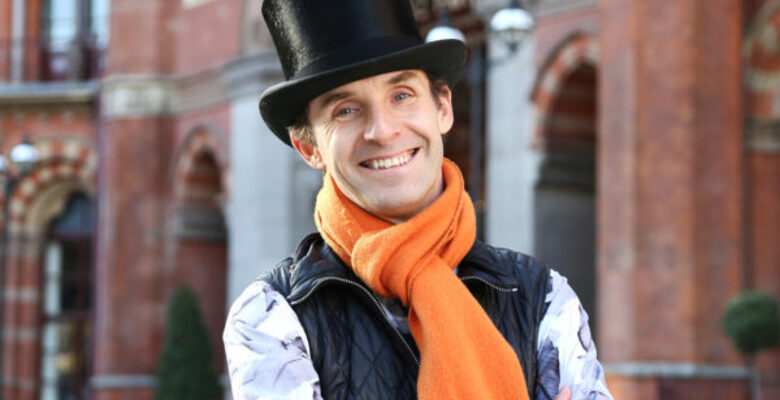
Kostya Pinaev may be the most well-known Russian-speaking guide in London. His trademark top hat is recognised even by those who haven’t been on his excursions. Before our interview, I managed to walk around Covent Garden with him. This stroll left me with a feeling similar to that of an arthouse film; our route was dotted with a great many elegant visual snapshots. Only Pinaev can pick out the antique hook for a policeman’s cloak on the wall of the house by the crossroads, draw the attention of his charges to the yellowing ginkgo tree in the middle of China-Town, or tell the story of the graffiti depicting a sleeping person under a real stairway. He calls this beauty, London style.

Your tour, Around London in 40 Steps, requires constant energy and focus. You have been doing it for many years now. Do you ever worry that your enthusiasm for this city might run out?
Of course, I worry about it. At the start, giving guided tours was my hobby. I worked on Sundays and I feared that as soon as this project turned into a job, it would become boring. But I still get a real kick out of it, and when I return from holiday, I’m eager to get back to it. I suppose you need a particular mindset and personality; you have to like talking to people and love the city. I really love all of it. The experience of the pandemic made me really understand this, as, during the lockdown, I had another job giving legal consultations. That was difficult for me. I’m hyperactive, I can’t stay in one place and I like to talk to people. I have a good memory for things that I find interesting and I easily take in information when I listen to people. It seems to me that people feel this because many of them say that they look for sincerity and naturalness in a guide. Authenticity is especially valued in this time of information overload.
Over your years as a guide, do you feel that you have become a star?
My popularity rose gradually, even from the time when I had a blog on LiveJournal [a popular Russian social networking service- translator’s note]. When I moved to London in January of 2006, social media had only just appeared. I started a blog so as not to have to answer the same questions again and again, and my readers started to come to me for guided tours. By the way, I still keep in touch with Ilya Varlamov [a popular Russian vlogger- translator’s note].
Working with Ilya Varlamov’s Youtube channel has only boosted the popularity of your tours, I think. How do you work with him?
He is a complete one-off, entirely unique individual. During his tour, everyone else was listening and nodding, but Ilya walked along with his nose stuck to his telephone. I asked him ‘are you listening to me?’ and he went ‘aha’. When I got up the next morning, I’d barely rubbed the sleep from my eyes before he’d written a post based on our walk. He’d added photos that he’d carefully selected and edited. He is phenomenally hard-working.
Do you consider yourself an advanced, level 80 Londoner these days? You probably know 100 times more about the city than the average resident…
Local resident syndrome is a classic. In this respect, Londoners are no different from Muscovites. Yes, I probably know more than the typical resident, but all the same, there are gaps in my knowledge, as London is absolutely bottomless. Very often I take a step to the left or right and notice all kinds of new things and new layers…when I discover a whole new aspect of the city, I am amazed yet again and I just think ‘wow!’.
What can you talk about endlessly?
I’ve always loved street art, it gives you a fresh slice of modernity. Writing something on a wall is quasi-legal, so you have to have strong feelings to do it. Street art is always topical. I could also talk for a long time about the Beatles. Those guys were ahead of their time, everyone knows them. What’s more, this year I just can’t get William Hogarth's engravings out of my head.
What interested you in an artist who lived back in the 18th century?
I’m a visual person, and Hogarth piqued my interest because, as an artist-poet, he has a very subtle feeling for location. He creates a visual code to denote a neighbourhood using the characteristic objects that define it. No one at that time had a feeling for the city like Hogarth did. All the London locations in his pictures are still quite recognisable, 250 years on. How did he manage it?
So what code does the area where you live have? Don’t you live in Islington?
Let’s say that Islington is very old and much passed through (everyone travelling north goes through it). There are lots of pubs, shops and restaurants. People have lived here for over 200 years and some parts of it are even older. You can really feel that there are many layers of history here. Islington is right next to the City, which is where many of the district’s residents work, as lawyers and insurance brokers. Consequently, it’s noticeable that there is money about. Islington is very creative but without the pretensions of the West End. It attracts many people from the creative professions.
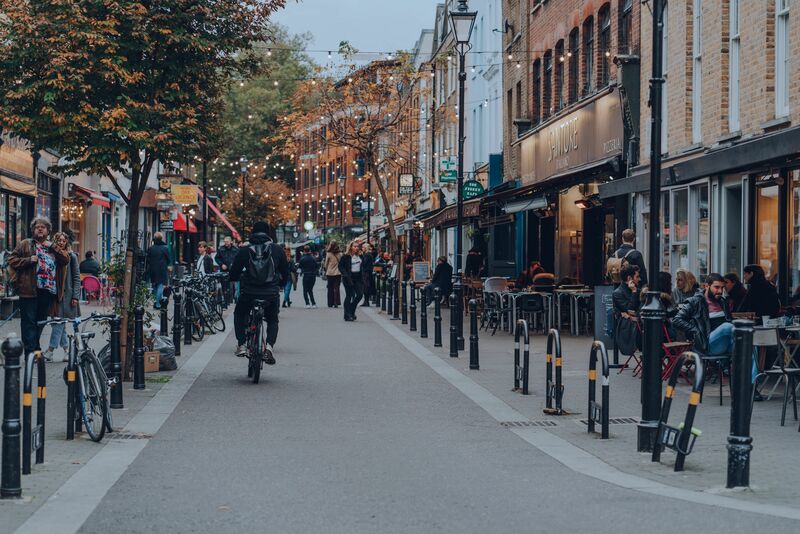
If you had no restrictions, financial or childcare related, where would you like to live? Would you stay in London?
Islington is wonderful, I really love it. I also like Bloomsbury and the City. Possibly, like many English people, I will spend my final days in the south of France. I’d like to believe that I will have enough money for my old age, but after recent events, this seems less likely. The last few years have been hard for tour guides, first because of the pandemic, and then due to the war. But still, we’ve survived.
Have you noticed how London has changed over the last 16 years? Especially after Brexit finally happened, swiftly followed by the pandemic?
London is a city which is only pretending to be old. In fact, it’s young, dynamic and always changing. As a guide, I go around the same places and I can see the trends very clearly, but new developments stratify gradually, so it’s hard to say if anything is changing very much at any given moment. However, if I go back to areas where I haven’t been for a while, then yes, I am astonished by how everything looks different. For the first year, we lived in Canada Water, then we moved away and I had no more cause to go there. When I went back 10 years later, it was a different town. We’ve just walked around Covent Garden. 10 years ago there weren’t many restaurants and Facebook and Google didn’t have offices there. The people have also changed over that time.
What did the typical Londoner look like 10 years ago?
London has always been international and multicultural, and this hasn’t changed. Now everything has got much more expensive and it seems to me that the city’s inhabitants have become more on edge. These two things are related. People didn’t use to drink in Soho the way they do now. The city had a more conservative look to it and the pace of life was calmer. Now, the city has become more colourful, London has got younger and has become more high-tech. (As for our Russian-speaking community, 15-16 years ago some of them were IT specialists, but now it’s 90% of the community. Pretty much all the recent arrivals work in IT). And also, after Brexit, London has got a little more toxic.
I have read your interview from 2012 when you said that real Londoners all go to the pubs and read the papers. During the pandemic, pubs were shut down, and newspapers went online only. Many people still haven’t come back offline. How did Londoners themselves change in this period?
Newspapers can renew themselves. People read online these days. Yes, everyone really missed the pubs. It’s one of the things which has breathed life back into the city. When I walked around the place during the pandemic and everything was closed, it was really frightening. Then, for a time, they let us stand outside pubs and drink, and I set off to one of these places with a colleague. Londoners (and all Brits) keep their distance from you. Many locals know my face and I know theirs, but they’ll never come up and say hello. But we were standing there and someone came up and said ‘I used to work at Gordon’s’ (the oldest wine bar in London),’ and I saw you there’. It seemed that people were hungry for human contact. Now we all ignore each other again, as it should be in a big city.
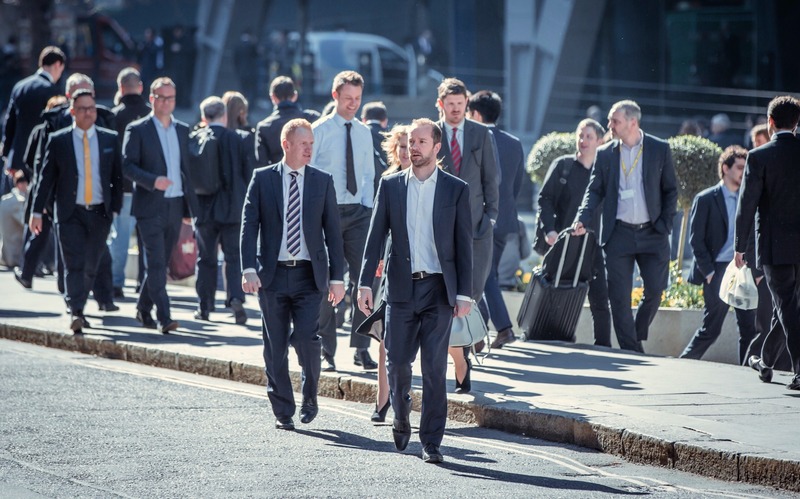
Could I have a lifehack for new arrivals? Are there any unspoken rules of behaviour that nervous first-time visitors to London should know if they walk alone into a pub?
One of the little rules recognised in a pub is that if you sit at the bar, people can talk to you. It’s a place for informality, where there are no strangers. But you must be able to do small talk. The subjects of conversation can be varied, from what you’re wearing, or what’s happening in the news, to the weather, sport, or the pub itself. Any topic at all, as long as it’s not too personal.
Has your inner Briton acquired any typical local habits?
Yes, for example, the polite hint. Also, I take off my shoes at home and I don’t wear slippers. Sometimes, if I need to go out somewhere, I may sit down wearing my boots. One time I went home to see my parents in Balashikha (Moscow Region), and I forgot to take off my shoes. Also, like a Brit, I’m ready to endlessly criticise the government. I’ve always been like that, even when I lived in Russia, but there, I was a bit of an exception to the rule. When you come here, you realise how much they are always complaining about the government, always and everywhere. And it must be criticised, otherwise, everything starts to fall apart.
What about the English stiff-upper-lip?
This is a long-standing stereotype; the stiff-lipped lords of the 19th century. I have to say that stereotypes take a long time to form and even longer to die. Having a stiff upper lip means you can’t express emotions at all. It seems to me that the British are actually quite good at expressing positive emotions, they are very warm, but they express negative emotions through reserved half-hints. While I was still working in the corporate world, I was always struck by how the English use their hints to try to bring out everything good in you, while ignoring all the bad, in the hope that any problems will sort themselves out in the end. And it works, it motivates you to work well, not because you’re afraid of messing up, but because you want to get better and become a professional. Internal motivation is more organic.
Have Russian-speaking tourists sometimes complained during your tours that London has broken their stereotypes of life in England? ‘I came here thinking that there’d be gentlemen in tweed suits drinking tea from china cups with their little fingers stuck out, but it’s a right mess, there are hijabs wherever you look!’ Has anyone been angry?
First of all, people like that don't go on excursions. If someone comes to me, that means they want to learn something new, to understand what is happening around them and take the city in. I haven’t encountered such unbridled racism. Russians, especially those who are in London for the first time, have stereotypes that come from Dickens and Sherlock. That was in the 19th century and now we are in the 21st. Many things surprise them, including the ethnic diversity (multiculturalism?) of London. But you have to remember that this same Russia is isolated by vast tracts of empty forest and steppe (and now by its own Iron Curtain). It has always been quite an isolated country. But Britain is built on multiculturalism. When you explain that, people seem to understand it. Returning to the question of whether those who are looking for an argument go on guided tours…arguments occur when there is a conflict of interests, whether corporate, political or financial. People come on my tours to have a good time, so we’re on the same wavelength and nobody starts a quarrel.
Today we had Ukrainian refugees in our group, as well as Russians, both recent arrivals and long-term residents, and we all somehow got along. But if you go on tour at the weekend, most of them will be people who have come to live in London. Some of them will have come recently. They tend to work at Google or Facebook and so on. These are people of the younger generation, they understand personal freedom, they have no problems being tolerant, you don’t have to explain to them about multiculturalism. Despite being ethnically diverse, I found Moscow to be intolerant in all aspects. In Russia only one thing enjoys widespread tolerance; that’s the Kremlin. They can put up with that endlessly, but for some reason, they have no tolerance for anything else. But there is a new generation of idealists. Russians who value freedom have come here.
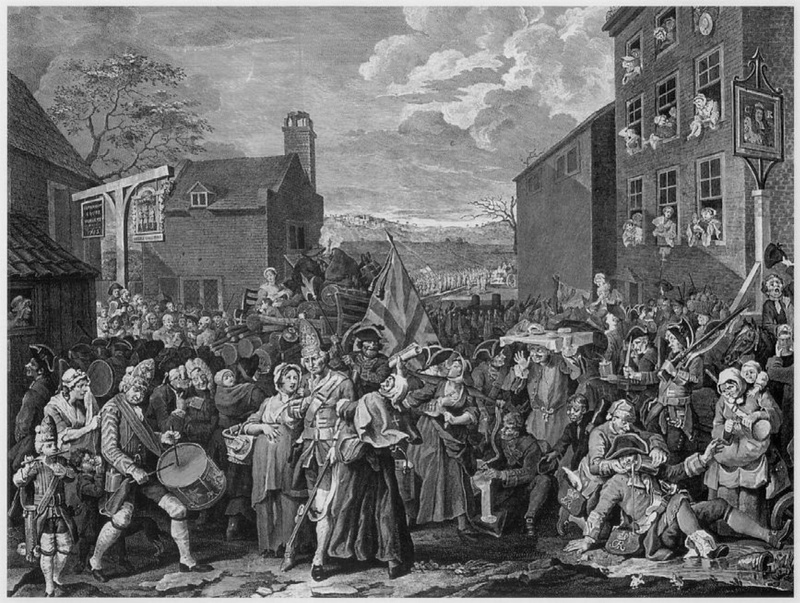
What do you make of the complaints of Russians from the big cities about the standard of service in London? They say everything is expensive, places close early and delivery is iffy…
It can be quite funny. One time I asked Kseniya Sobchak [a prominent Russian journalist and socialite]: ‘Why don’t you come to London? You have everything you need to do so’. She answered 'It’s expensive here'. I almost died of laughter. But in fact, if they want to emulate the standards, and above all maintain the lifestyle expected by rich Muscovites, they find it difficult to afford, it’s an unjustifiable luxury over here. In my view, coming to London is a good excuse to leave old habits behind and take up new ones. You can begin to appreciate different things in life and go around town on a bike (even if you can afford a car). Use public transport, even if you could hire a driver, and have a drink in an ordinary pub rather than in a luxuriously decorated restaurant.
And what do you get in exchange?
In exchange, you’ll get an inebriating feeling of personal freedom. You will stop expressing yourself through money. Of course, people show off here too, but it’s more mature, subtle and discreet. It can be done via postcodes, houses, schools, professional self-realisation, travel and other things. It seems to me that these things help you to express yourself much better (although not in the Maslow Pyramid). There is Old Money, which is a little more genuine, durable and authentic, and there is New Money, which is crass, inept and likely to be only temporary. London forces you to be a little more reserved and dignified as if you’d always had money. Even if you have base instincts, you’re required to hide them as the society around you expects this. Again, many people come here for freedom, predictability and the deep feeling that it’s all not just a rat race for the latest Mercedes or what have you. Compared to Moscow, London is a city which is less tense and more sure of itself. It’s calm and reserved. Different people react in their own ways to the environment out and about in London. It has a good effect on me. Moscow oppresses me, the atmosphere is aggressive and on edge. All the time someone is trying to prove something to someone, although there is no need.
Is there anything that you can’t get used to about London? What alarms or irritates you? Is there anything you haven’t been able to accept or understand over these last 16 years?
The city is definitely going through a rough patch. It’s like a soap opera that has gone on too long, at a certain moment everything in politics started to get stuck, there have been significant pauses, events repeated themselves, and all the actors now have the same jokes. It seems to me that the Conservatives are at a stage at which they can’t come up with anything new and all they can offer is inconsequential piffle. It’s all very sad; there are no bobbies on the beat and absolute lawlessness reigns, I see all kinds of things happening that never used to. When we had only just arrived, 16 years ago, the health service used to work. Of course, we were young then, although we’re still not old. The rich are getting richer while the poor are getting poorer and the contrast is getting more obvious. All this means that London isn’t going through the best of times. The money is sort of flowing, but only one way. Renting is insanely expensive and buying a good home is very hard. If you go to Europe, you see that the situation is better for healthcare and law and order, and house prices aren’t like they are over here. But, of course, you can’t get a haircut at three in the morning. This, again, is what Muscovites complain of; ‘I wanted a pizza and no one would bring one at one in the morning’, or ‘no one would come to paint my toenails on a Sunday evening’. It’s just that the Moscow jobs market is completely lawless. Here they understand that people should have their weekends off and sleep at night. And if it annoys you that no one will wait on you hand and foot 24-7 for a pittance, then that’s your problem, and not this city’s.
Has the economic crisis made you consider moving elsewhere?
No, for me London was a case of love at first sight, and over the years this affection has only got stronger. I found myself here. Actually, in London, anyone can find themselves a neighbourhood where they feel comfortable, a little street or pub where there will be people similar to you. It’s hard to predict anything in advance, but for 16 years now it’s been plain sailing. I wanted to come here so I did. The first couple of years were tricky, I didn’t feel like I had a very firm footing until I had a circle of friends and I felt comfortable speaking English at work. During that time it was hard not to look back. But the last time I did that was in 2008-2009.
In an interview with our publication, Varlamov said that the provinces smell of death. You have probably been to other towns. Have you ever thought of organising tours in them?
There are people who love provincial towns and see something in them other than death. But I like to live in places that are bubbling with life, which is to say in cities. In many ways, I like Islington because it’s quiet and low-rise, everyone has their own personal space, and at the same time, there are a hundred and two restaurants just around the corner. Dickens called this place the Devil’s Mile (to be more precise, ‘Devil’s Acre’-Editor’s note), and everyone enjoys themselves here.
Have you ever felt the influence of the English class system?
Have I? I felt it straight away. Class here is everywhere and in all things; the system permeates society. We had a baptism of fire. We became fast friends with our neighbours, an elderly couple. They are real aristocrats and original thinkers, they always tried to flout the established order on principle. For them, we were an exotic toy (but we are still friends, we’re still in touch). They opened our eyes to the gulfs between people which class forms. Members of the British working class can earn a decent living, but they remain working class because this is determined not so much by earnings, as by their origin, background, area of work, lifestyle and surroundings. Even if you earn a lot, people will identify you as working class, but that won’t bother you. By contrast, you may be middle class and constantly worry about being mistakenly identified as from another class. Despite economic developments, the British class system remains unchanged. This area is actually easier for new arrivals from other countries. We are a little outside the class system and a little mysterious to the typical British person. By default, they are more likely to assign us to the middle class than to the working class.
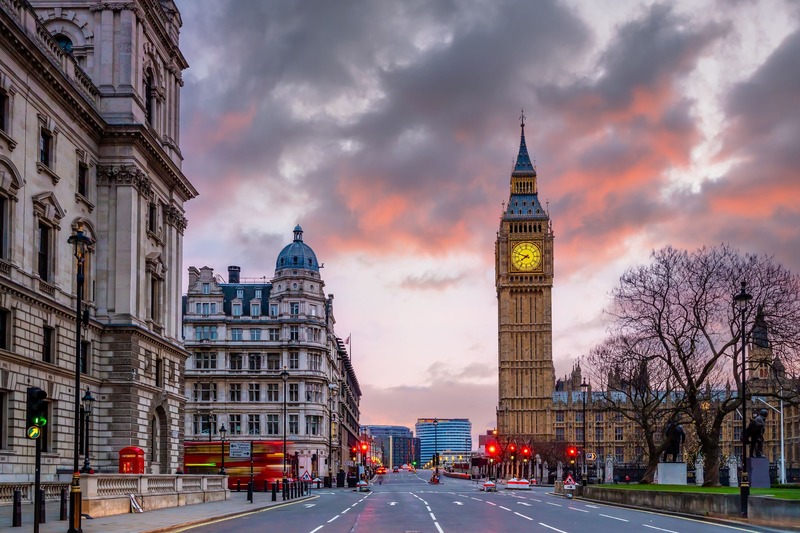
What else are we to expect from Around London in 40 Steps? Are you planning any new tours?
Since the city is changing, I will show people these changes. It is often difficult to design entirely new tours. It is like the curse of the second album for musicians who have standards to maintain and need to think of something new. The imps of creativity need time to do their work. So far, I’ve never done the main tourist trails: classics like Westminster, Trafalgar Square and Buckingham Palace…it’s a challenge to follow a path already beaten by hundreds of guides. The idea is hanging over me like unfinished coursework. But I’m confident it will soon bear fruit.






